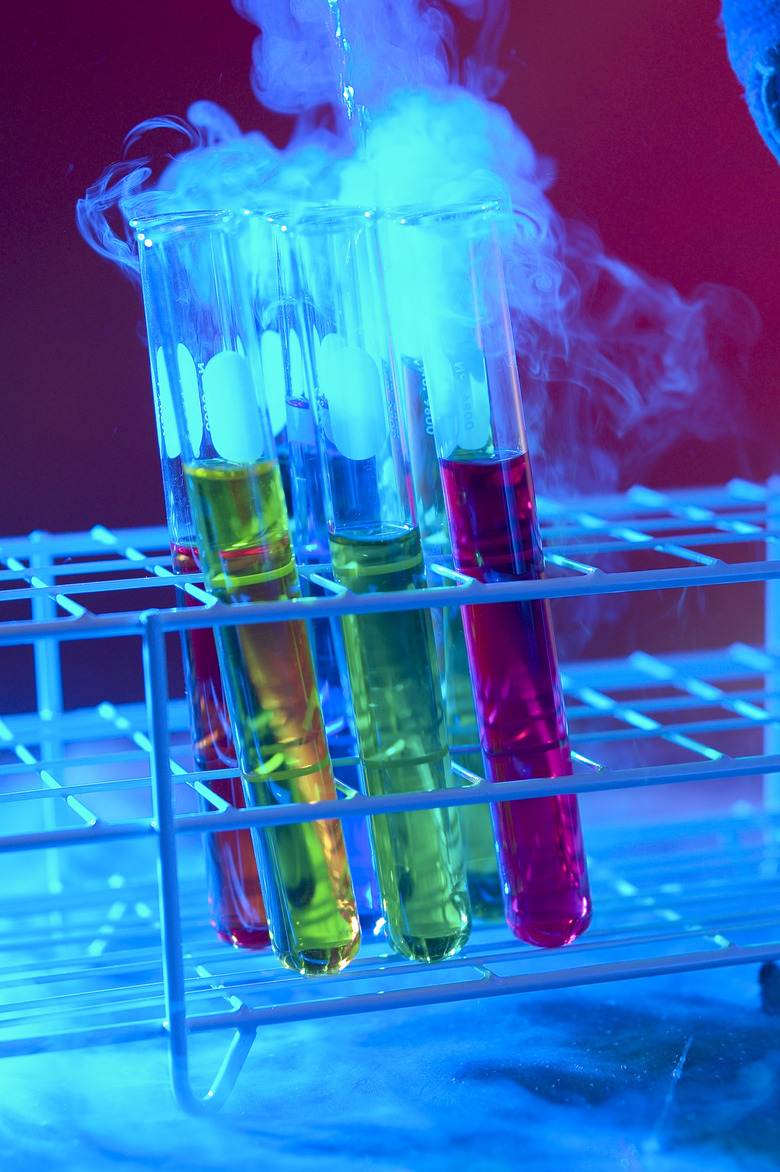Does The Mass Of The Reactants Affect The Rate Of Chemical Reaction?
The rate of a chemical reaction refers to the speed with which reactants are converted to products, the substances formed from the reaction. Collision theory explains that chemical reactions occur at different rates by proposing that in order for a reaction to proceed, there must be enough energy in the system for the reactant particles to collide, break chemical bonds and form the final product. The mass of the reactant particles determines the amount of surface area exposed for possible collisions.
Reaction Rates
Reaction Rates
Several factors, including the mass and concentration of particles available to react, influence the rate of a chemical reaction. Anything influencing the number of collisions between particles also affects the reaction speed. Smaller reactant particles with less mass increase the chances for collisions, which increases the reaction rate. A massive complex molecule with remote reactive sites will be slow to respond, no matter how many collisions take place. This results in a slow reaction rate. A reaction involving less massive particles with more surface area available for collisions will proceed more quickly.
Concentration
Concentration
The concentration of the reactants determines the speed of the reaction. In simple reactions, an increase in the concentration of reactants accelerates the reaction. The more collisions over time, the faster the reaction can advance. The small particles have less mass and more surface area available for the collisions of other particles. However, in other more complex reaction mechanisms, this may not always hold true. This is often observed in reactions involving huge protein molecules with large masses and convoluted structures with reaction sites buried deep with in them that are not easily approached by collision particles.
Temperature
Temperature
Heating puts more kinetic energy into the reaction, causing the particles to move faster so that more collisions occur and the reaction rate increases. It takes less heat to energize smaller particles with less mass, but it can have negative results with large massive molecules, such as proteins. Too much heat can denature proteins by causing their structures to absorb energy and break the bonds holding the sections of the molecules together.
Particle Size and Mass
Particle Size and Mass
If one of the reactants is a solid, the reaction will proceed faster if it is ground to a powder or broken apart. This increases its surface area and exposes more small particles with a smaller mass but a larger surface area to the other reactants in the reaction. The chances of particle collisions increase as the reaction rate increases.
A graph plotting time against the total amount of product produced shows that chemical reactions usually begin at a fast rate when the reactant concentrations are largest and gradually decelerates as the reactants are depleted. When the line reaches a plateau and becomes horizontal, the reaction has concluded.
Cite This Article
MLA
Evans, Diane. "Does The Mass Of The Reactants Affect The Rate Of Chemical Reaction?" sciencing.com, https://www.sciencing.com/mass-reactants-affect-rate-chemical-reaction-10036414/. 24 April 2017.
APA
Evans, Diane. (2017, April 24). Does The Mass Of The Reactants Affect The Rate Of Chemical Reaction?. sciencing.com. Retrieved from https://www.sciencing.com/mass-reactants-affect-rate-chemical-reaction-10036414/
Chicago
Evans, Diane. Does The Mass Of The Reactants Affect The Rate Of Chemical Reaction? last modified August 30, 2022. https://www.sciencing.com/mass-reactants-affect-rate-chemical-reaction-10036414/
